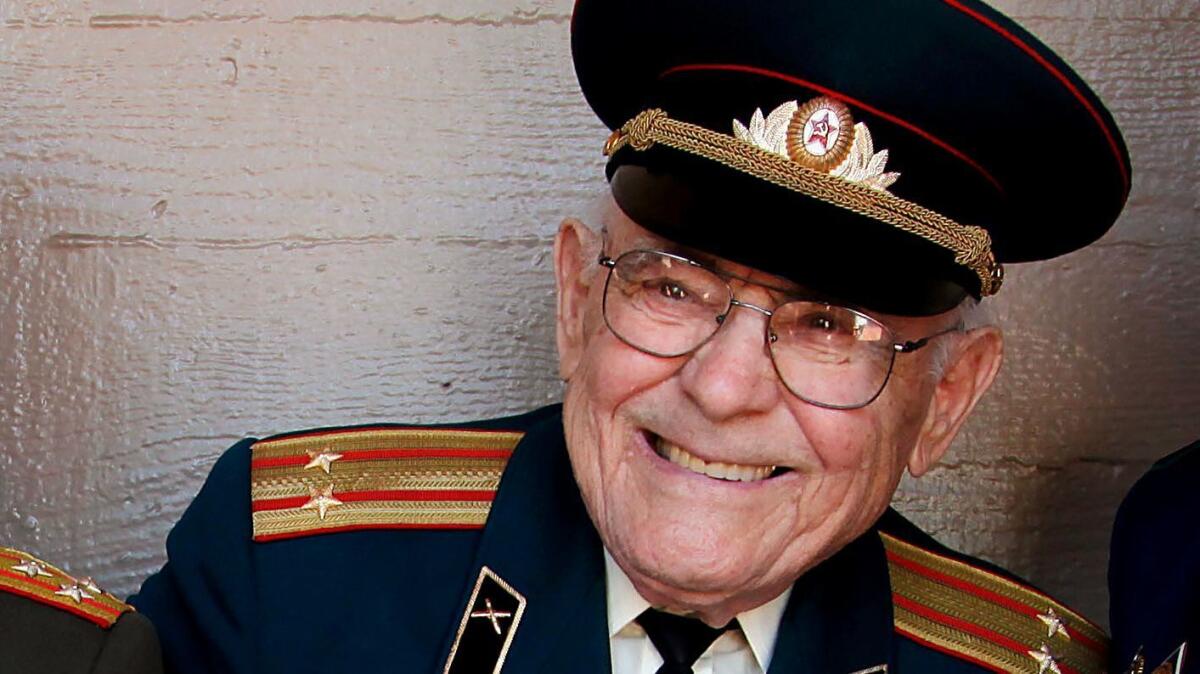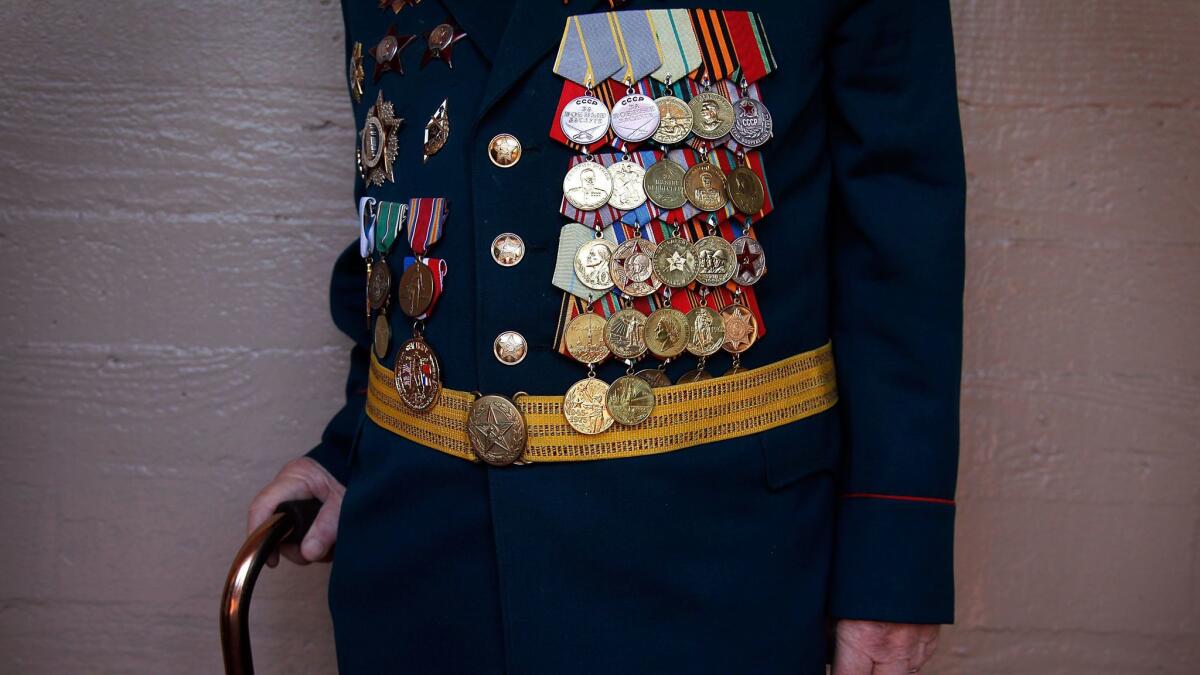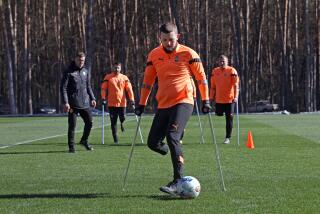Yefim Stolyarsky, who fought to preserve the legacy of Russian-speaking veterans, dies at 94

- Share via
In March, Yefim Stolyarsky convened a meeting of fellow Russian military veterans and announced that he was stepping down as president of the Los Angeles Assn. of Veterans of World War II.
His health was fading and the group’s membership had been hollowed out with the passing years. He said he hoped it was still possible for the group to survive, and possibly even expand by attracting young members.
“He knew it was getting more and more difficult for him to work,” said Boris Melamed, 80, the veterans association’s current president. “It was like he felt that just a little of his life remained.”
Stolyarsky died Thursday at Cedars Sinai Medical Center in Los Angeles of a brain tumor, his son, Yevgeny Stolyarsky, said. He was 94.
“He fought for over five months, but unfortunately the illness was tougher,” his son said.
For most of his life, Stolyarsky was just that — a fighter.
Born in 1923 in Brovki Pervyye, a small town west of Kiev in the then-Soviet republic of Ukraine, Stolyarsky served 30 years in the Red Army.
During World War II, he served as a division commander and a squad leader, rising to the rank of lieutenant colonel. He was twice wounded as he battled to help prevent the Nazis from seizing St. Petersburg, then known as Leningrad, during an 872-day siege of the city. He lost two ribs.
He received several decorations and awards for his service during the war.

After retiring from the military in the late 1960s, Stolyarsky worked in a meat factory and later organized an agricultural cooperative, which grew crops and produced honey.
With his wife Ala, Stolyarsky immigrated to the U.S. in 1991 as a refugee from the former Soviet republic of Moldova, where Russians and Jews faced hostility and discrimination after the collapse of the Soviet Union.
“There was a lot of tension,” Stolyarsky’s son said. “It became too dangerous for Russians. We decided we had to move.”
While many older Soviet emigres tended to “relax” once they arrived in the U.S., for Stolyarsky it was an opportunity to continue what he loved most — being active.
Among other things, Stolyarsky joined the Los Angeles Assn. of Veterans of World War II, a West Hollywood-based group that was inaugurated in 1977 by a handful of Russian-speaking veterans as a social group and support network. In 1996, he became president.
“The very existence of the association is even stronger than brotherhood,” Stolyarsky told The Times in a 2014 interview. “There is such unity. When those of us who served on the front meet … those of us who were on the edge of death, enduring bombs, lost our military comrades … it’s an inexplicable feeling.”
He was concerned about preserving the legacy of the association and hoped that the group could expand, attract young people and thrive. He wanted to ensure the history and sacrifice of Russian-speaking World War II veterans was not forgotten.
At its peak the association’s membership grew to more than 2,200. Today, there are but 108 registered members, many of them now living in convalescent facilities, leaving fewer than 25 active participants. The average member age is 94, Melamed said. The eldest is 103.
“He was an amazing leader,” Yulia Shikhleman, 84, the widow of a former Red Army officer and an association member, said of Stolyarsky. “He understood people really well.”
Melamed echoed the sentiment.
“He had enormous energy, a voracious ability to work and was a talented organizer,” he said. “He undertook colossal work on behalf of our organization, ensuring its unity and existence.”
Stolyarsky also served for several years as a member of West Hollywood’s Russian Advisory Board, created by the city in 2000 to address the needs of Russian-speaking residents.
“He was a warm-hearted man who brought together many of our Russian-speaking residents,” West Hollywood Mayor John Heilman said in an email. “He served as an important bridge between the city and our immigrant community.”
In 2014, the Russian Advisory Board awarded Stolyarsky its Life Achievement Award for his service in the Russian-speaking community in Los Angeles.
Melamed said that it was Stolyarsky’s initiative that led to the 2005 establishment of a memorial in West Hollywood’s Plummer Park honoring Soviet veterans of World War II.
Aside from the association and civic duties, Stolyarsky had different hobbies. He grew flowers on the balcony of his apartment. He liked to play chess, and he was the family’s cook, “not my mother,” the younger Stolyarsky said.
Melamed said the association recently agreed to continue through the year and then reassess its future. With an aging membership and surviving primarily on annual dues of $24 a year, the association is struggling, Melamed said.
However, he said, the veterans would try to maintain the association’s legacy by continuing to document their history and sharing their experiences with young people, as Stolyarsky had wanted.
“His memory will forever be preserved in our association,” Melamed said.
Stolyarsky is survived by his son; a daughter, Ludmila Stolyarskaya; a grandson; and two great-grandchildren. His wife died in 2014.
For more on global development news, see our Global Development Watch page, and follow me @AMSimmons1 on Twitter
More to Read
Start your day right
Sign up for Essential California for the L.A. Times biggest news, features and recommendations in your inbox six days a week.
You may occasionally receive promotional content from the Los Angeles Times.







